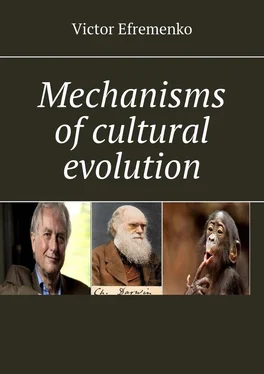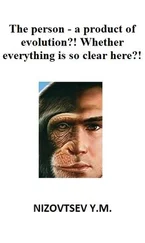Mechanisms of cultural evolution
Victor Efremenko
© Victor Efremenko, 2020
ISBN 978-5-0051-8833-5
Created with Ridero smart publishing system

The book attempts to reconstruct the milestones of the evolutionary path that the Primate species Homo sapiens followed to create civilization. The final stage of the evolution of this species was cultural evolution, which turned it, which did not have any significant morphological advantages, into the dominant species on the Planet earth.
This became possible because the final stage of the evolution of Homo sapiens did not occur as the evolution of other species – due to the creation of some morphological advantages (fast legs or sharp fangs) for themselves, but due to behavior modification. Behavior modification became possible with some brain structure that appeared in our ancestors. The evolution of the brain provided, in the long run, great advantages for the species in survival and reproduction.
Upsetting some, I still have to declare that man is not a divine creation, and did not even descend from a monkey, he is an advanced primate, whose behavior is regulated not only by the system of instincts created by genetics, implemented through the structures of the brain, but also by the second system on top of the first genetic, a functional system, but also implemented by brain structures.
In other words, for a person we have a control system with two control loops nested one into the other. Such control systems in regulation theory are called systems with subordinate regulation. The inner loop output serves as the input to the outer loop. In simple words, this means that cultural evolution takes place taking into account the existing morphology and instincts of the species Homo sapiens.
The external control loop is formed by functional brain regulators MEMs, which determine the mentality of a person and are often factors that restrain instinctive (genetic) behavior. But this inhibition is not observed in all cases, not in all individuals, and not always. Therefore, you have to look at a person from two points of view in order to better understand him – from the socio-cultural and biological.
Human societies are populations subject to natural selection, capable of inheriting acquired cultural achievements. Note that a person on a desert island cannot evolve culturally. Only societies can evolve, just as populations evolve in biology, not individuals.
Evolution, including cultural, must have 3 indispensable attributes inherent in the biological evolution of any living object. For biological evolution, these are species variability, selection and inheritance.
Genes provide for variability and inheritance, and Darwinian selection weeds out nonviable specimens. Genes are replicators in biological evolution.
The cultural evolution of social behavior, like any evolution of living things, must also have these attributes.
Since the genes that serve as replicators of the entire biological evolution cannot fix the beneficial changes acquired during life (this is a postulate of genetics), it must be admitted that the observed cultural evolution of a person, apparently, occurs with the help of other replicators (MEMs) and another inheritance mechanism.
It should be mentioned that there is no evolution of culture in itself. Culture is inanimate and cannot evolve. The fading of colors over time in the artist’s painting cannot be called the evolution of culture.
Only the expression «human cultural evolution» makes sense.
We have yet to give a definition of culture, since no one has yet proposed such a definition (adequate).
For the first time, a generalized concept of culture is formulated in the book, mechanisms of human cultural evolution are proposed, where MEMs are replicators, the totality of which is phenotypically manifested as a mentality that creates a psychological portrait of a person, determines the way of his thinking and, ultimately, determines his behavior in specific conditions. In other words, mentality is considered as the phenotype of the entire complex of human MEMs.
This approach to cultural evolution makes it possible to build some models of the behavior of local societies, carefully applying the schemes of population genetics.
Sociology studies the behavior of people in large and small societies. This is done purely empirically. No basis other than philosophical conjectures has been laid as a basis, which is important for the practice of science. The founders of this science began to develop from scratch, not taking into account that Homo sapiens is one of the primate species undergoing a stage of cultural evolution.
Since philosophers have penetrated into this science, they raise as the most important naive, meaningless questions: «Are people able to control the conditions of their own lives, or are their actions a consequence of the influence of external social forces? Is society a product of human action?»
The influence on human behavior of genes, upbringing, education and the social environment is considered differently by different schools of sociologists. But unambiguous answers to these questions can be offered by sociobiology. It is she who should become the basis of sociology in order to fill the desert between biology and sociology.
Human societies (societies) are only biological objects that develop over time under the influence of selection, like all other species of living nature, and inheritance is an integral part of this development. Man and societies are part of biological evolution, which claims that all living objects in nature originated from one original living object.
The idea of evolution cannot be considered only one of the hypotheses explaining the world order, as stubborn creationists preach. This is the only reasonable theory that allows you to combine the available information about the life of different creatures at different times.
Even Pope John Paul II announced in an appeal to the Catholic Church that the Vatican agreed to transfer Darwin’s evolutionary teachings from the category of hypotheses to the rank of scientific theory. In his speech, the Pope recognized it acceptable to believe that the human body is the result of evolution.
If you recognize these obvious statements, then discussing the turns of the evolutionary path of societies should be based on evolutionary theory, and not philosophical and moral and ethical ideas, because they are different for different people or groups, are adaptations of culture to the situation at certain points in time and therefore change along with the furnishings.
The conclusions, as a result of this type of discussion, will be different by different researcher s.
In science, the conclusions drawn by scientists on the basis of the presented experience should be the same. If some scientific theory does not allow making unambiguous conclusions, then the theory is considered unsatisfactory.
For example, if some issues of intracellular development are considered, then the conclusions of American and Russian scientists will be in agreement, but if issues related to social development are considered, i.e. development with the participation of many multicellular organisms of the species Homo sapiens, there is usually no agreement.
No, because the researchers are on different platforms and have different points of view. If we discuss social issues from one universal platform of sociobiology, then the differences can be overcome as a result of discussion. Therefore, I propose a unified platform for discussing social issues. But there are many influential opponents of convergence of views who parasitize on this difference.
Читать дальше













